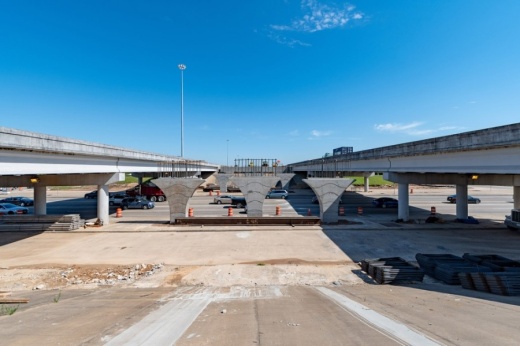The group, Keep Texas Moving, was announced at a July 20 virtual press conference by the Texas Association of Business, an Austin-based advocacy group that pushes for pro-business policies at the state level.
With congestion levels worsening and a mobility crisis looming, TAB Vice President Aaron Cox said private partnerships could help advance projects such as optional toll lanes, which he said could be built faster and at no cost to taxpayers.
"We would love to build free roads, but the reality is our tax revenues are just not keeping pace with the need and the growth we are experiencing, especially now that COVID-19 and lower energy prices are really hammering the state and our transportation funding sources," Cox said in a July 20 virtual press conference. "Those funding sources come directly from that tax revenue."
The Texas Department of Transportation has engaged in similar projects in the past, Cox said—including on a project to expand Hwy. 288 in Houston with new toll lanes—but the department's authority to enter into public-private partnership projects expired in 2017. However, projects can still be approved at the individual level by the Legislature.
Texas voters approved a pair of statewide propositions—Proposition 1, which passed in 2014, and Proposition 7, which passed in 2015—that diverted portions of oil and gas severance taxes, general sales taxes and motor vehicle sales taxes to the State Highway Fund, which is used in part to help fund about one-third of TxDOT's annual budget.
In a July 20 update, Texas Comptroller Glenn Hegar told state officials to expect a historic drop in state revenue by the end of fiscal year 2020-21, with motor vehicle sales tax revenue and severance tax revenue among the hardest hit sources. The highway fund is projected to get about $1.1 billion in transfers this fiscal year, based on collections from the previous fiscal year, Hegar said. However, next year's transfer—which will be based on collections from this year—is projected to fall to $620 million, he said.
Cox said funding was insufficient to address gridlock on Texas roads even before the oil price woes.
"The need for improving and expanding Texas roadways is outstripping available funding," he said. "That was true before Texas was hit by the double barrel assault of COVID-19 and the worldwide fall in energy prices."
Keep Texas Moving is not advocating for any specific projects to be prioritized, a decision Cox said would be up to TxDOT and local metropolitan planning organizations, such as the Houston-Galveston Area Council. He said a good starting place could be looking at the annual Most Congested Roadways report released by the Texas A&M Transportation Institute.
According to the 2019 report, several Houston-area roads are among the most congested in the state, including Loop 610 between the Katy Freeway and the Southwest Freeway, which took the No. 1 spot, as well as portions of the Southwest Freeway and Eastex Freeway, which ranked third and fourth, respectively.
With overall state revenue on the decline, Cox said more private funding for road projects would also allow the state to preserve its tax dollars for other needs such as Medicaid, disaster preparation and law enforcement.
Part of the challenge moving forward will involve finding the private entities willing to fund projects, but the decision on whether the state turns to private funding will ultimately be in the hands of state lawmakers, Cox said.
"Our hope is that they will be more open to [private] funding and allow for the private sector to partner with the state government and build out the infrastructure we need to make sure we are effectively moving people [and] products and allowing everyone to conduct commerce," Cox said.





